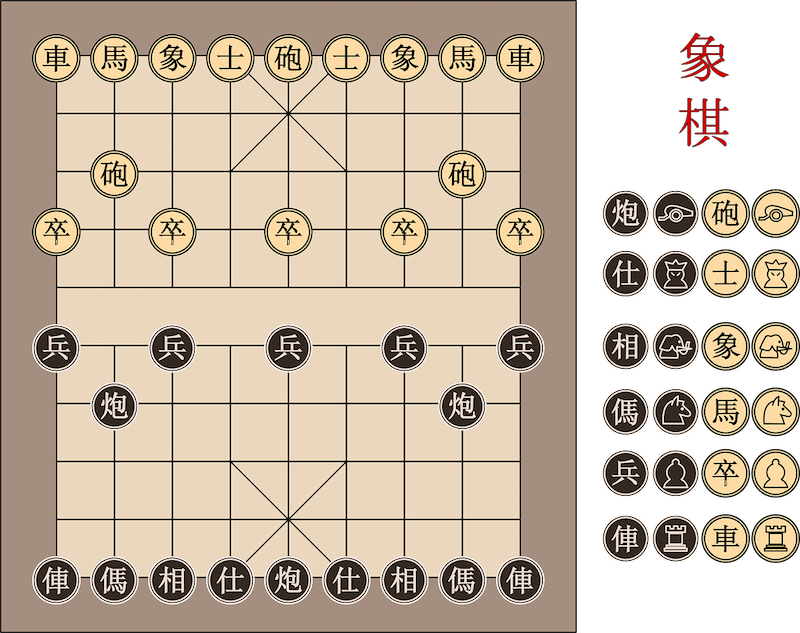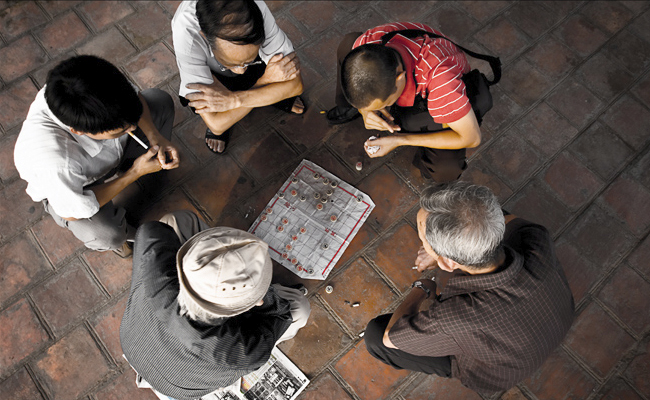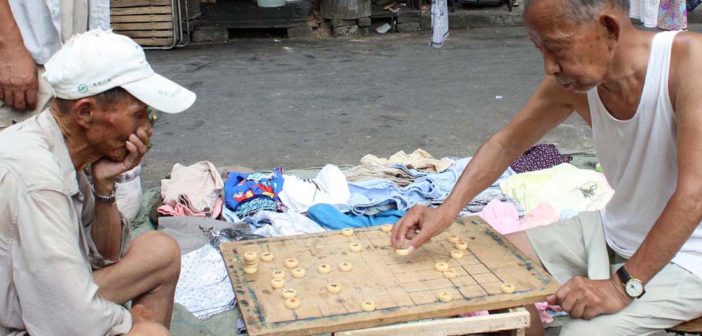[Suggestions on where to play Chinese Chess can be found at the end of this post.]

If you’ve been living in China for a while, you have most likely seen people play Chinese Chess, or Xiangqi, in many places, including on the streets, in alleys, or in the courtyards. Usually there are a lot of people surrounding one chess board during a game. Although this game is meant for two players, input is given by bystanders with various levels of experience; therefore, the social aspect of this game is just as important as the game itself.
Unlike the social and cultural elements surrounding the game, the history behind it is not quite clear. The origins of Chinese Chess have been well debated even among scholars.
Part of the debate of this game’s history stems from the linguistic ambiguity of the character Xiang. The character Qi describes a strategy game, but Xiangqi has several meanings including “Elephant Game,” or “Constellation Game.”
There are multiple reasons why Xiangqi can be translated to the Elephant Game. The first reason is that the game pieces were made of ivory, a material that comes from elephant tusks. Secondly, many records show that the Chinese incorporated elephants in the military. Furthermore, an elephant is also one of the chess pieces. Those who interpret the characters Xiangqi to mean “Elephant Game” believe that the game evolved from the more ancient Indian game, Chaturanga.
Some scholars, primarily Chinese ones, believe that Xiangqi evolved from a Chinese game called Liubo, These scholars theorize that the game is a simulation of astronomy and that the game pieces mimic the movements of objects in the night sky, hence the translation “Constellation Game”.
The earliest form of Chinese Chess can be traced back to the Warring States era when military strategists used small objects to visualize the potential battlefield. David H. Li, an author on Chinese history and chess, believes that Xiangqi was invented by Chinese General Han Xin around 200BC. Han Xin supposedly drew on the earlier game, Liubo, as well as on the teachings of Sun Tzu’s The Art of War, an ancient Chinese military treatise from the 5th century BC, in order to represent a particular battle anticipated by his troops.

For centuries, the term “Joy inside a mandarin” has been used as a nickname of Xiangqi. The origins of this nickname might have to do with a legend involving Chinese Chess.
A long time ago, according to a Chinese legend, there was a farmer growing mandarin oranges somewhere in southwest China. One day, when he was harvesting his fruit, the farmer found two large mandarins the size of bowls. Out of curiosity and joy, he decided to bring them home.
After he cut them open, he found two old men with long grey hair and beards inside each of the fruits playing a game with many different pieces. Annoyed by the sudden interruption, one of the old men announced that they had to leave. The old men quickly ascended into the sky riding small dragons. Since then, Xiangqi has also been called the Orange Game.
Cen Shun, a native of Yu Nan, lived in a deserted house in Xia Zhou. Every night he heard sounds of military drums. One night, a messenger from the Golden Elephant Kingdom visited him in his dreams and warned him that they would soon be at war against the Tian Na Kingdom. The messenger invited Cen to watch and suddenly, the mouse hole at the bottom of a wall became a gate of a castle and two armies stood facing each other outside the castle.
A military advisor went to the Golden Elephant King and informed him about their military strategy. He said, ‘The flying horse (knight) goes diagonally and stops at three (third line), the general moves all over the field, the wagon (rook) proceeds straight into the enemy’s territory, and soldiers should not move sideways.” The King agreed to proceed with this strategy. When the drums sounded, a horse jumped three feet diagonally. The drums sounded again and a soldier marched one foot sideways. The drums sounded a third time and the wagon rolled forward. With this invincible strategy, the war lasted less than one day. The Tian Na Kingdom was badly defeated, forcing the king to flee south-west.
Cen’s family members felt uncomfortable about the occurrence. They dug open the mouse hole and found an ancient tomb. Cen had been living in a house that had been built over an old grave. Inside the tomb was a game board with pieces made of gold and copper. They finally realized that the military strategy given by the advisor were the movements of game pieces.
Chinese Chess and You
Xiangqi is one of the most popular games in China, and this complex strategy game lives at the heart of the country’s culture. The China Culture Center offers private Xiangqi lessons that will help you on your journey to mastery. Apps such as HOXChess or Chinese Chess / Co Tuong, or websites such as this one may also be useful. If you’re really keen about immersing yourself into the Chinese culture, you could even ask locals about letting you watch them play the game live.
photos: www.hutong-school.com, theworldofchinese.com, pixabay.com




